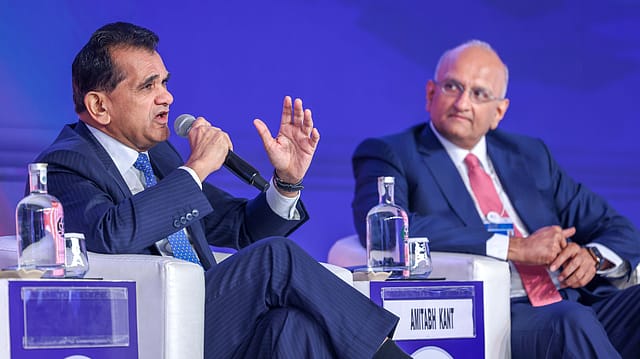G20 to support digital agriculture ecosystem: Amitabh Kant, G20 Sherpa
ADVERTISEMENT

G20 member countries, being major agricultural producers, consumers and exporters, have come together to take a collective responsibility towards transition of their agriculture ecosystems into sustainable and resilient systems during India's G20 presidency, says Amitabh Kant, G20 Sherpa.
Support for such an integrated ecosystem would also mean developing standards and protocols in the digital agriculture ecosystem to ensure interoperability and availability of quality data to enable cross border transactions and promote innovation to drive this transformation, he says.
Delivering the keynote address at the G20 India Agri-tech Summit 2023 on August 28 in Delhi, Kant says the countries are committed to achieve this through strengthening policies and collaborative actions for accelerating innovation and use of digital technology. "Fundamentally, our ambition should be to transform the agriculture, the agri-food sector into an attractive modern business enterprise. This needs to be done by keeping the farmers at the core of the digital revolution by facilitating affordable access to an inclusive digital infrastructure and exploration of digital tools that cater to the needs of the agro sector," he says.
According to him, digital and technological advancement can translate into several innovative practices like providing farmers real time data, creating crop protection forecast models, integrating artificial intelligence (AI) for projections regarding crop disease outbreak, etc.
"Promoting investments in the startups, incubators, and accelerators were highlighted in the (G20's) agricultural track this year. Technology can be employed at all stages of the agriculture and food systems. Digitisaiton and fintech services with digital inclusion in a comprehensive manner and scale will promote resilient agro food system value chains," Kant says.
February 2026
Despite a challenging global business environment and geopolitical turmoil, MNCs are a major part of the story of Corporate India. As the country moves closer to its Viksit Bharat goal, these multinationals are playing an increasingly pivotal role in shaping that future. Fortune India’s second edition of the MNC 500 list offers a comprehensive look at the performance of the 500 largest multinationals in India. The issue also decodes Budget 2026, highlighting the government’s long-term vision to sustain the economic momentum.
Noting that India has more than 1,000 startups in the agri sector at the moment, he says such startups can provide innovative ideas and affordable solutions to tackle a number of challenges faced all across the agricultural value chain. "Agri-tech startups have the potential to change the very face of the agro food industry and raise farmers’ income. They are critical to the whole value chain," he says.
On the need to create a dynamic database, Kant felt that such a platform that seamlessly provides precise information about the farmers characteristics and agricultural sector statistics with a wealth of supplementary information encompassing weather patterns, demand and supply dynamics, market potential and much more, has the potential to empower our farmers to make informed decisions. Stakeholders across various domains including the policy makers and experts will also benefit from the key insights delivered through such a data sharing network, he points out.
Kant also says that the key to India's success in digitising the agriculture ecosystem will be the adoption of such high-tech services by farmers including small farmer holders.
"Unless the technology does not reach the small farm holders, we will not be able to see increased productivity. The promise of new and emerging technologies is very important to us and it beckons to raise a call of action. A multidimensional and multi stakeholder approach is considered the best course to adopt. We now need to push agricultural data and agricultural outcomes with digitalisation in agriculture. This should bring in the next big green revolution in agriculture. This should be the foundation stone for enhancing the agriculture productivity in India and making it to globally the best levels," he says.
The Summit, hosted as part of India's G20 Presidency, brought together thought leaders, experts and stakeholders from across the globe to explore transformative solutions for the future of farming.
